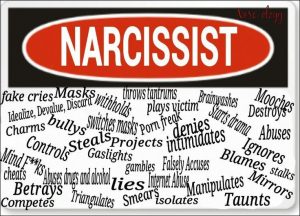Why can’t you both just get along for the sake of the children?
 Those words are like nails on a chalkboard to anyone who has been through a divorce with someone who suffers from Narcissistic Personality Disorder (NPD). While divorce can bring out the worst in a healthy person, a divorce involving someone with NPD is like inviting the devil himself onto the battlefield. The narcissist appears to be charming, charismatic and endearing to those whom he encounters yet outside of the courtroom, he is calculated, manipulative and many times, downright dangerous. The untrained observer may perceive the situation to be about two immature parents who are not capable of putting their children first.
Those words are like nails on a chalkboard to anyone who has been through a divorce with someone who suffers from Narcissistic Personality Disorder (NPD). While divorce can bring out the worst in a healthy person, a divorce involving someone with NPD is like inviting the devil himself onto the battlefield. The narcissist appears to be charming, charismatic and endearing to those whom he encounters yet outside of the courtroom, he is calculated, manipulative and many times, downright dangerous. The untrained observer may perceive the situation to be about two immature parents who are not capable of putting their children first.
Sadly, many of the untrained observers are the very people who are tasked with deciding the fate of the children caught in the middle of these highly contentious custody battles. A narcissist is like the modern day version of Dr. Jekyll and Mr. Hyde. I once tried to explain to the Judge in my own divorce case that I didn’t know the man sitting 5-feet to my left. The man sitting next to me in the courtroom was not the same man who I was attempting to co-parent with. This man claimed to love his children and want to spend time with them however; his actions did not match his words.
According to the DSM IV-TR, between 2 percent and 16 percent of the population in clinical settings are diagnosed with Narcissistic Personality Disorder. Some argue that we should be working diligently to educate the Family Court on these individuals however, such education seems to be the last thing the Family Court is interested in pursuing. After a contentious custody battle with a narcissist which spanned over four years, I have witnessed many of the cracks in the Family Court first-hand.
- Words vs. Actions: When words and actions are not in alignment, further investigations should take place. Narcissists are master manipulators yet their actions are never in alignment with their words.
- Perjury: Changes need to be made when it comes to individuals who are caught lying. Perjury is taken very seriously in every courtroom except the Family Court System.
- Education on Personality Disorders: Education on NPD needs to begin in law school and continuing education on personality disorders should be mandatory for each person who has a hand in the Family Court such as Independent Children’s Lawyers, Judges, Counsellors, Family Report Writers and Solicitors.
- The Best Interest of the Child: Cases are often pushed through the courtroom like cattle. Ample time needs to be devoted to hearing high-conflict cases. When it takes longer to adopt a puppy from the dog pound than it does to decide the fate of a child, something is very wrong.
- Court Orders: Even with court orders in hand, it can be difficult to enforce court orders. When dealing with individuals with NPD, court orders need to be very concise and void of wiggle room. If there is any room for manipulation in court orders, a narcissist will find it.
- Parental Rights vs. Best Interest of the Child: While the Family Court System is supposed to act in the best interest of the child, this is not happening. Parental rights seem to carry more weight than what is truly in the best interest of the child. The ability to procreate should not automatically guarantee rights that override a child’s well-being.
Related Family Law Judgments



